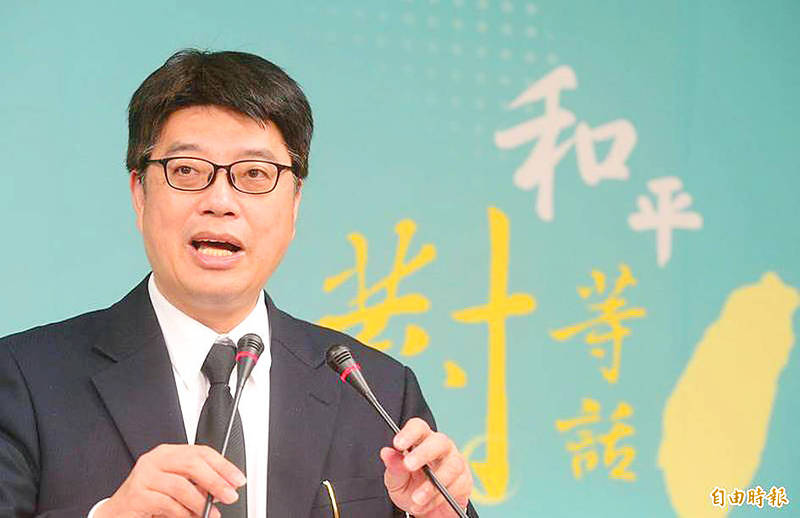《TAIPEI TIMES》 PRC urged to adopt ‘four commitments’

Mainland Affairs Council Deputy Minister Chiu Chui-cheng speaks at an event in Taipei in an undated photograph. Photo: Chung Li-hua, Taipei Times
POLICY UNCHANGED: The ‘commitments’ were laid out by Tsai Ing-wen in 2021, when she said Taiwanese are committed to defending sovereignty and democracy
By Chen Yu-fu / Staff reporter
The Mainland Affairs Council (MAC) yesterday urged Beijing to accept the “four commitments” touted by President Tsai Ing-wen (蔡英文), and give up its military coercion and trying to force Taiwan into a political framework, so that people on both sides of the Taiwan Strait can resume friendly, healthy and orderly interactions.
The council issued the remarks in response to a New Year’s message by China’s Taiwan Affairs Office Director Song Tao (宋濤), in which he was quoted by Xinhua news agency as saying that he would have “wide and in-depth negotiations with people of vision in Taiwan on cross-strait relations and unification with China.”
Song said that this year would be the start of “thoroughly implementing the spirit of the Chinese Communist Party’s [CCP] 20th National Congress,” and that the CCP would persist in taking Chinese President Xi Jinping’s (習近平) “Thought on Socialism With Chinese Characteristics for a New Era” as guidance.
On the foundation of the “one China” principle and “the 1992 consensus,” the CCP would have “wide and in-depth negotiations with people of vision from different fields in Taiwan,” he said.
The so-called “1992 consensus” — a term that former MAC chairman Su Chi (蘇起) in 2006 admitted making up in 2000 — refers to a tacit understanding between the Chinese Nationalist Party (KMT) and the CCP that both sides of the Taiwan Strait acknowledge that there is “one China,” with each side having its own interpretation of what “China” means.
In response, the MAC yesterday said that the government’s cross-strait policy remains unchanged, as mentioned in Tsai’s New Year’s address on Sunday.
Tsai said that all stakeholders in the region bear a shared responsibility for “peace and stability in the Taiwan Strait,” which is what everyone hopes for, and that “war has never been a way to solve problems, and only through dialogue, cooperation, and joint efforts toward the goals of regional stability and development can we help more people enjoy security and happiness,” the MAC said.
It hopes Beijing would first improve its domestic economy, as well as the health and safety for its people, the MAC said, adding that Taiwan is willing to offer disease prevention and humanitarian assistance.
It urged Beijing to practically accept Taiwan’s “four commitments,” which are the Taiwanese commitment to defend the nation’s sovereignty and democracy, as well as to enhance the “resilience of four key areas” and achieve the “four major goals.”
The “four commitments” were mentioned by Tsai in her Double Ten National Day speech in 2021, in which she said that Taiwan’s government and its people “are committed to maintaining a free and democratic constitutional system, ensuring that the Republic of China and the People’s Republic of China will not be subordinate to each other, resisting annexation or encroachment upon Taiwan’s sovereignty, and guaranteeing that the future of the Republic of China is decided by the will of Taiwanese.”
Meanwhile, Cross-Strait Policy Association researcher Wu Se-chih (吳瑟致) yesterday said that according to the constitution of the People’s Republic of China, the CCP is the only legitimate political party, so China-friendly political parties or groups in Taiwan would be forced to accept the “one China” principle and the so-called “1992 consensus” if they want to negotiate with the CCP.
However, it would be inappropriate if Taiwan’s opposition parties negotiated with the CCP, as issues concerning cross-strait relations should be led by the president, he said.
新聞來源:TAIPEI TIMES



















